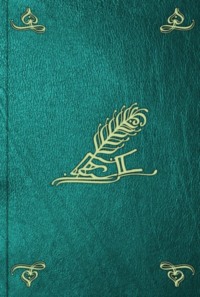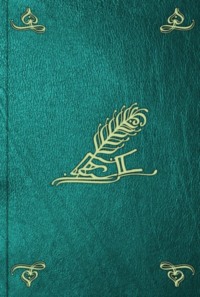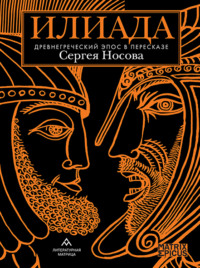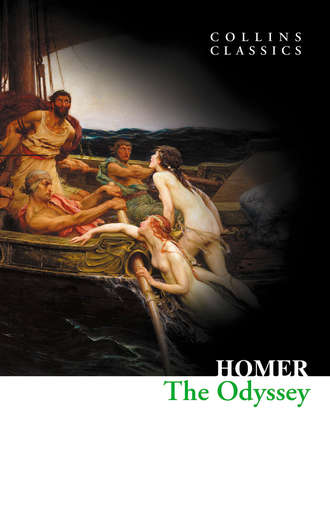
Полная версия
The Odyssey

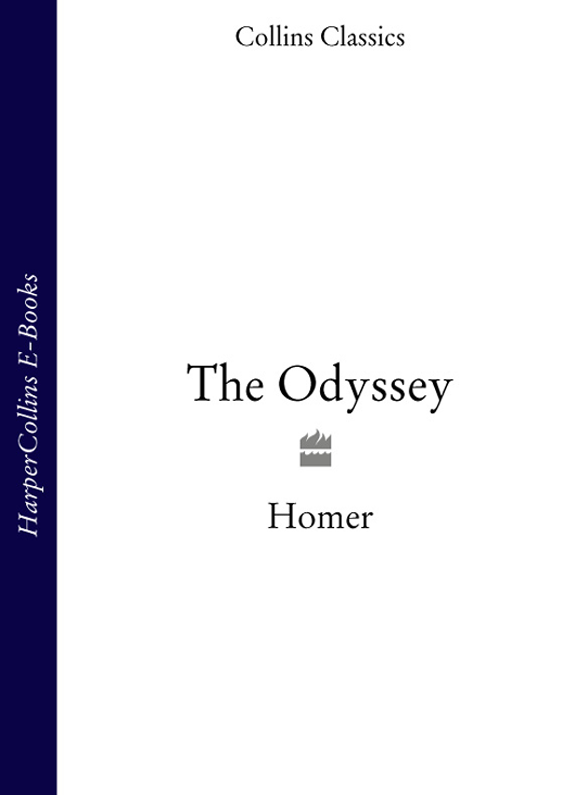
THE
ODYSSEY
Homer

CONTENTS
COVER
TITLE PAGE
BOOK 1
BOOK 2
BOOK 3
BOOK 4
BOOK 5
BOOK 6
BOOK 7
BOOK 8
BOOK 9
BOOK 10
BOOK 11
BOOK 12
BOOK 13
BOOK 14
BOOK 15
BOOK 16
BOOK 17
BOOK 18
BOOK 19
BOOK 20
BOOK 21
BOOK 22
BOOK 23
BOOK 24
CLASSIC LITERATURE: WORDS AND PHRASES ADAPTED FROM THE COLLINS ENGLISH DICTIONARY
ABOUT THE AUTHOR
OTHER WORKS
TRANSLATOR’S NOTE
HISTORY OF COLLINS
COPYRIGHT
ABOUT THE PUBLISHER
BOOK 1
By now the other warriors, those that had escaped headlong ruin by sea or in battle, were safely home. Only Odysseus tarried, shut up by Lady Calypso, a nymph and very Goddess, in her hewn-out caves. She craved him for her bed-mate: while he was longing for his house and his wife. Of a truth the rolling seasons had at last brought up the year marked by the Gods for his return to Ithaca; but not even there among his loved things would he escape further conflict. Yet had all the Gods with lapse of time grown compassionate towards Odysseus – all but Poseidon, whose enmity flamed ever against him till he had reached his home. Poseidon, however, was for the moment far away among the Aethiopians, that last race of men, whose dispersion across the world’s end is so broad that some of them can see the Sun-God rise while others see him set. Thither had Poseidon gone in the hope of burnt offerings, bulls and rams, by hundreds: and there he sat feasting merrily while the other Gods came together in the halls of Olympian Zeus. To them the father of Gods and men began speech, for his breast teemed with thought of great Aegisthus, whom famous Orestes, the son of Agamemnon, had slain.
‘It vexes me to see how mean are these creatures of a day towards us Gods, when they charge against us the evils (far beyond our worst dooming) which their own exceeding wantonness has heaped upon themselves. Just so did Aegisthus exceed when he took to his bed the lawful wife of Atrides and killed her returning husband. He knew the sheer ruin this would entail. Did we not warn him by the mouth of our trusty Hermes, the keen-eyed slayer of Argus, neither to murder the man nor lust after the woman’s body? “For the death of the son of Atreus will be requited by Orestes, even as he grows up and dreams of his native place.” These were Hermes’ very words: but not even such friendly interposition could restrain Aegisthus, who now pays the final penalty.’
Swiftly there took him up Athene, goddess of the limpid eyes. ‘Our Father, heir of Kronos, Lord of lords! That man Aegisthus has been justly served. May everyone who slaughters a victim after his fashion go down likewise into hell! But my heart is heavy for Odysseus, so shrewd, so ill-fated, pining in long misery of exile on an island which is just a speck in the belly of the sea. This wave-beset, wooded island is the domain of a God-begotten creature, the daughter of baleful Atlas whose are the pillars that prop the lofty sky: whose too are the deepest soundings of the sea. The daughter has trapped the luckless wretch and with subtle insistence cozens him to forget his Ithaca. Forget! Odysseus is so sick with longing to see if it were but the smoke of his home spiring up, that he prays for death. I marvel, my Lord of Olympus, how your heart makes no odds of it. Can you lightly pass over the burnt offerings Odysseus lavished upon you, by the Argive ships in the plain of Troy?’
‘My child,’ protested Zeus, the cloud-compeller, ‘what sharp judgements you let slip through your teeth! As if I could overpass the merit of Odysseus, who stands out above the ruck of men as much for worldly wisdom as for his generous offerings to the Gods that eternally possess the open sky. It is Poseidon the world-girdler who is so headily bitter against him, for the sake of that Cyclops whom Odysseus blinded, even the god-like Polyphemus, their chief figure and Poseidon’s very son: – for his mother Thoosa (daughter to Phorkys, an overlord of the ungarnered sea) conceived him after she had lain with the God under the beetling cliffs. Because of this, Poseidon the land-shaker, though he dare not quite kill Odysseus, at least implacably frustrates his every effort to get back to the land of his fathers. But come, let us put all our heads together and contrive the man’s return; then will Poseidon have to swallow his bile. Against the concert of the Immortals he cannot stand alone.’
Athene the clear-eyed, the Goddess, answered and said: ‘Father and Lord of all, Kronides, if indeed the ineffable Gods now judge it fit that prudent Odysseus should return, then let us call Hermes, our usher, the killer of Argus, and despatch him straight to Ogygia, the island of that nymph with the lovely hair: to warn her how it is become our fixed act that the dauntless one be allowed to set out homeward forthwith. For my part I shall go to Ithaca and rouse his son Telemachus, instilling some tardy purpose into his spirit, so that he may call his Greek exquisites to council and give check to the mob of wooers besetting his mother Penelope, the while they butcher his wealth of juicy sheep and rolling-gaited, screw-horned oxen. I will send the youth to Sparta – yes, and to sandy Pylos – to ask those he meets for news of his dear father’s return: not that he will hear anything, but his zeal will earn him repute among men.’
She ceased, and drew upon her feet those golden sandals (whose fairness no use could dim) that carried their mistress as surely and wind-swiftly over the waves as over the boundless earth. She laid hold of her guardian spear, great, heavy, and close-grained, tipped with cutting bronze. When wrath moved the goddess to act, this spear was her weapon: with it, and stayed by her pride of birth, she would daunt serried ranks of the very bravest warriors. Downward she now glided from the summit of Olympus, to alight on Ithaca before Odysseus’ house, by the sill of the main gate. With that war spear in her fist she seemed some traveller seeking hospitality: she had a look of Mentes, a chief in Taphos.
The gateway was thronged with the self-assertive suitors, whose pleasure for the moment was to sit there playing at chequers on the hides of the oxen they had killed and eaten. Round them bustled their criers and nimble pages, some mixing wine and water in the parent-bowls ready to drink, others wiping down table-tops with soft sponges or re-laying them for the next meal, while yet others were jointing huge sides of meat. If the suitors saw her they did not move or look before handsome Telemachus gave sign. He sat despondent in the hurly, fancying to himself his honest father’s sudden arrival from somewhere, somehow: and the scatter there would be, through the palace, of these wasters when they saw him stride in to regain men’s respect and king it honourably once more over his household.
As he so dreamed amidst the unheeding suitors he became aware of Athene waiting by the threshold; and went straight to her, vexed to the heart that any guest should be delayed at their door for lack of welcome. He clasped her right hand, relieving her of the metal spear, and spoke to her these winged words: ‘Accept, O guest, the friendliest greetings. Enter and taste our food: and thereafter make known to us your every need.’
Whereupon he led the way into the noble house. Pallas followed until he set her spear in the polished spear rack beside a high pillar, amongst weapons once used by the long-suffering Odysseus. Then he spread smooth draperies over a throne of cunning workmanship and seated her upon it. For her feet there was a foot-stool, while for himself he drew up a painted lounge-chair in such a way that they were shut off from the suitors. Telemachus feared lest that roistering mob’s impertinences might disgust the stranger and turn his stomach against eating. Then too he wished to put some privy questions about his missing father.
A maid came with a precious golden ewer and poured water for them above its silver basin, rinsing their hands. She drew to their side a gleaming table and on it the matronly house-keeper arranged her store of bread and many prepared dishes, making an eager grace of all the hospitality. A carver filled and passed them trenchers of meat in great variety, and set out on their table two golden beakers which the steward, as often as he walked up and down the hall, refilled for them with wine. The suitors swaggered in. One after the other they seated themselves on the thrones and long chairs. Their retainers poured water for their hands, and the maids of the house heaped loaves of bread in each man’s table-basket while the serving lads brimmed the wine-cisterns with drink. Every hand went out to the abundance so laid ready.
But when their lusting for food and drink had been assuaged the suitors began to mind them of other things; of singing and dancing, those twin glories which crown a feast. The steward returned with a very splendid lyre for Phemius, whose hap it was to play the bard for them, under compulsion. He ran his hands over the strings, plucking out an exquisite air, under cover of which Telemachus bent towards clear-eyed Athene and said softly, that the company might not overhear: –
‘Honoured stranger, will my words offend? I pray not. They now have their minds easy for music and verse, these suitor-maggots who freely devour another man’s livelihood. Freely indeed, without let or fine! Ah, if they did but catch a glimpse of the Master returning to Ithaca, how they would beseech high heaven for the gift of swifter running rather than more wealth in gold or raiment. But alas, his bones whiten to-day in some field under the rain: or the swell rolls them through the salty deep. Yea, he has perished dreadfully: nor would a glow of hope kindle in our hearts if the wisest man on earth told us he was coming home. The sun of his return has utterly gone down.
‘Enough of this – instead, tell me, I pray you, and exactly, who you are: of what state and stock? You came, I suspect, by ship; for I am very sure that by dry land you found no road. But what were the sailors who put you ashore in Ithaca, or rather, what did they profess themselves to be? I ask all this in order to satisfy myself that you are really a new-comer, tasting our hospitality for the first time, and not a guest entailed on us by my father: for so great a traveller was he, you know, that our house is honoured by throngs of his acquaintance from every land.’
Then said the clear-eyed Goddess, ‘I will meet all these questions of yours frankly. My name is Mentes. My father Anchialus was a noted warrior. I am a leader of the oar-loving islanders of Taphos. I put in here with my ship and crew on our way across the wine-dark sea to Temesa, where we hope to barter a cargo of sparkling iron ore for the copper of those foreign-speaking people. My ship is berthed well away from the city, in Reithron, that lonely inlet which lies below tree-grown Neion.
‘Between our families there is a long tradition of friendship and guesting, which father Laertes will confirm, if you ask him: though they tell me that he now comes no more to town, because of the infirmities of his advanced years. Wherefore he buries himself in his secluded vineyard, among his vine-stocks on their ordered terraces: up and down which the old man drags himself, slow step after step, cherishing the grapes, until the feebleness of age once again takes him sorely by the knees. Then he rests, for the old woman, his sole attendant, to wait on him with restoring meat and drink.
‘And the reason for my present visit? Because I heard that HE was back. I mean your father: for be assured that the marvellous Odysseus-has in no wise perished off the face of the earth: though it seems the Gods yet arrest him in midpath of his return. And therefore (albeit I am by trade no teller of fortunes, nor professed reader of the significance of birds), therefore I am about to prophesy to you what the Deathless Ones have put into my heart and made my faith: – namely, that the day of Odysseus’ coming again to his native place is near. He may be penned within some surf-beaten islet ringed by the wide sea: or some rude tribe of savages may hold him in durance. But only for the time. Infallibly he will find means of escape, though they fetter him in fetters of the purest iron. The man is fertility itself in his expedients. – Now tell me something, plainly, as I have told you. Are you real and very son to Odysseus, you who are so well grown of body? His head and fine eyes you have exactly, as I remember him in our old association; for we were much together in the days before he set out for Troy in the hollow ships with all the chivalry of Greece; since when we have not met.’
Careful Telemachus answered thus: ‘Indeed you shall have it very plain, my friend. My mother says I am his son: for myself I do not know. Has any son of man yet been sure of his begetting? Would that I had been the child of some ordinary parent whom old age had overtaken in the quiet course of nature on his estate! But as it is, since you press it, they do name me the child of that vaguest-fated of all men born to death.’
Athene put to him one more question. ‘I think when Penelope conceived so goodly a son it was meant that the Gods had not appointed a nameless future for your stock. But give me the straight truth again. What feast or rout of a feast is this which rages about us? What part in it have you? Is it a drinking bout or some sort of marriage? No sodality would be thus indecent. A mannered man now, entering by chance, might well forget himself with disgust at seeing how outrageously they make free with your house.’
Soberly Telemachus answered her again, saying, ‘Stranger, since you probe into this also and put it to me, I must confess that our house looked to be rich and well-appointed while my father ruled it as master. But the Gods saw fit to order it quite otherwise when they spirited him away with an utterness beyond example. Had he plainly died I should not have taken it so hardly: above all had he died with his likes on the field of Troy in his friends’ arms, after winding up the pitch of battle to its height. For then the fellowship of Greece would have united to rear his funerary mound and the fame of his prowess would have been (for his son) a glorious, increasing heritage.
‘Instead we have this instant vanishment into blind silence, as though the Harpies, winged Scavengers of the Wind, had whirled him into their void: and I am left weeping with pain. Nor do I weep only his pain. The Gods have gone on to invent other evils for my count. Every man of authority in the islands, from Doulichion, and Same, and Zacynthos of the woods, as well as every figure of this rugged Ithaca – all, all, are come wooing my mother. It seems that she can neither reject the horrible offers, out and out, nor accept any one of them. So here they sit, for ever eating up my substance and making havoc of the house. Surely soon they will devour me too.’
Athene heard him out and then said fiercely, ‘A shameful tale! Here’s a crying need for Odysseus, to manhandle these graceless suitors. Would that he might appear now in the outer gate, erect, helmeted, with shield and two stabbing spears, the figure of a man I saw enter our house the first time we entertained him on his way up from Ephyra. He had been down in his war-vessel to get from Ilus, son of Mermerus, some deadly poison to smear on the bronze heads of his arrows. Ilus feared to affront the everlasting Gods and refused him any. So it was my father, carried away by the huge love he bore him, who furnished it. If only that Odysseus we knew might to-day thrust in among the suitors! Indeed their mating would be bitter and their shrift suddenly sharp. However such things rest on the knees of the Gods, whose it is to appoint whether he shall re-enter his halls and exact vengeance, or no.
‘Wherefore instead I counsel you to take most earnest thought in what way you shall by your single self expel the suitors from the house. Listen to this plan of mine which I would urge upon you. Tomorrow assemble all the Greek chiefs. Address them bluntly, calling the Gods to witness how you order; firstly, that the suitors disperse, every man to his place; and secondly, that your mother (if her nature yet inclines toward marriage) betake herself to the palace of the mighty man her father. It shall be for them, there, to make the new match for her, regulating rich dues and providing such wedding festivities as befit the alliance of a favourite daughter.
‘There remains your personal duty, on which also I have a word to say, if you will hear it. Get yourself a ship of twenty rowers, the very best ship you can find. Set forth in this to seek news of your long-overdue father. Even if no mortal tells you anything, yet who knows but there may steal into your mind that divine prompting by which Zeus very often gives mankind an inkling of the truth. Go to Pylos first and consult its revered Nestor; thence to Sparta where you will find brown-haired Menelaus, latest of all the mail-clad Achaeans to get back from Troy. If you learn that your father is living and has his face towards home, then steel your temper to one more year of this afflicted house. But if you learn that he is no more – that he is surely dead – then return and throw up a mound to his name, with the plenishing and ceremonial befitting a great fallen warrior: after which do you yourself give his widow, your mother, to some man for wife.
‘These things first. Yet also it must be your study and passion to slay these suitors in your house, either by fair fight or by stratagem. Childishness no longer beseems your years: you must put it away. My friend (I wish to call you that, for you are man in frame and very man in form), my friend, be brave, that generations not yet born may glorify your name. Consider young Orestes and the honour he has won in all men’s mouths by putting to death his father’s murderer, the crafty blood-boltered Aegisthus who trapped noble Agamemnon. No more – I must back to my swift ship: its waiting crew will be grumbling because I have delayed them all this weary while. Only a parting word – make it your instant and main effort to do as I have said.’
Heedful Telemachus replied, ‘Sir, the kindness of your advice to me has been like a father’s to his son: and I will ever gratefully remember it. But I beg you, however urgent your business, to delay your setting out till you have bathed and refreshed yourself. Then go to your ship, spirit-gladdened, with a gift from me in your hand: for it shall be a worthy gift to remind you of me always: some very beautiful treasure such as only great friend gives to friend.’
The Goddess Athene, the clear-eyed, refused him. ‘Do not try to hold me. I long to be on the way. As for this token which your friendly interest prompts, let it be mine on the return journey when I can carry it straight home. Choose your richest gift. It shall be matched by what I give you in exchange’ – and having so said she went, suddenly and elusively as a sea bird goes; leaving the young man quick with ardour and decision and more mindful of his father than ever of late. Telemachus, as he felt this change come to his spirit, was amazed. The persuasion took him that his visitant had been in some way divine. Accordingly his carriage as he went once more among the suitors reflected God-head.
To that audience the great singer still sang: and they sat round, hanging on the song which told of the woeful return entailed by Pallas Athene upon such Greeks as had gone to Troy. In her upper storey, Penelope, that most circumspect daughter of Icarius, caught rising snatches of the minstrelsy. Her wit pieced these together into their sense. Down she came by the high stairs from her quarters and entered the great hall: not indeed alone, for always two waiting women closely followed her. So, like a stately goddess among mortals, she descended upon the suitors: to halt there where the first great pillar propped the massy roof. As veil for her face she held up a fold of her soft wimple: and the ever watchful maidens covered her, one on either side. Thus stood she and wept, till she found words to address the inspired bard.
‘Phemius,’ she cried, ‘do you not know many other charmed songs for people’s ears? Songs in which poets have extolled the great deeds of Gods or men? Sing one of those, here from your place in the company which will, none the less, sit silently drinking and listening. But this lamentable tale give over: the sorrow of it slowly melts my heart within my bosom; for you tell of the event which has brought down upon me – me above all women – this unappeasable pain. So continually does my memory yearn after that dear head. O my lost hero! whose glory had spread throughout Hellas and Argos, the very heart of the land!’
Telemachus decently cut her short. ‘My Mother, why take it amiss that our trusty singer should entertain us as the spirit moves him? I think it is not poets who bring things to pass, but rather Zeus who pays out to men, the Makers, their fates at his whim: we have no cause against Phemius for drawing music out of the hard fate of the Danaans. A crowd ever extols the song which sounds freshest in its ears. Harden your heart and mind to hear this tale. Remember that Odysseus was not singular in utterly losing at Troy the day of his return. There were others, many others, who in the Troad lost their very selves. Wherefore I bid you get back to your part of the house, and be busied in your proper sphere, with the loom and the spindle, and in overseeing your maids at these, their tasks. Speech shall be the men’s care: and principally my care: for mine is the mastery in this house.’ She, astonished, went back up the stairs, laying away in her breast this potent saying of her son’s. But when she had regained the upper storey with her serving women she began to weep for Odysseus her lost husband, and wept until the grey-eyed Goddess Athene cast a pitying sleep upon her eyelids.
Behind her back the wooers broke into riot across the twilit hall, everyone swearing aloud that his should be the luck of lying in her bed: but to them the dispassionate Telemachus began, ‘Suitors of my mother and lewd ruffians: – tonight let us forgather and feast: but no shouting, please, to spoil our privilege of hearing this singer with the divine voice. Tomorrow I vote we go early to the assembly and all take seat there. I have to unburden my soul to you formally and without stint on the subject of your quitting this house: and to suggest that you remember your own banqueting halls in which you may eat your own food-stuffs and feast each other in rotation from house to house. But if you deem it meeter and more delightful to waste the entire substance of a solitary man, scot-free and for nothing – why then, waste away! Only I shall pray to the Gods – the ever-lasting Gods – on the chance that Zeus may decree acts of requital. In which case YOU will all be destroyed in this house, scot-free and for nothing.’
So he spoke: and they curbed their lips between their teeth to contain their astonishment at Telemachus’ daring to taunt them with such spirit. At last Antinous, son of Eupeithes, undertook to reply. ‘Why, Telemachus, those very Gods must have been giving you lessons in freedom of speech and heady taunting! All the same I doubt Zeus ever making you king of sea-girt Ithaca, even if that dignity does happen to be your birth-right.’
Said Telemachus with restraint, ‘Antinous, take not my words against the grain. If Zeus willed it I would assume even that charge ungrudgingly. You imply it is the worst thing that could happen amongst us men? Let me tell you it is not so bad a fate to be King: quickly does a royal house grow rich, and himself amass honour. However, since the mighty Odysseus is dead, surely this headship will fall to some one of the swarm of kings young and old now infesting this land of Ithaca. My determination and aims are bounded by this house – to be lord in it and over its bond-servants whom the triumphant might of Odysseus led in from his forays as thralls.’




